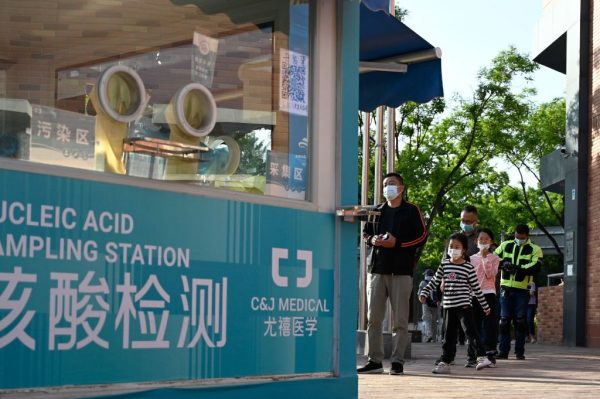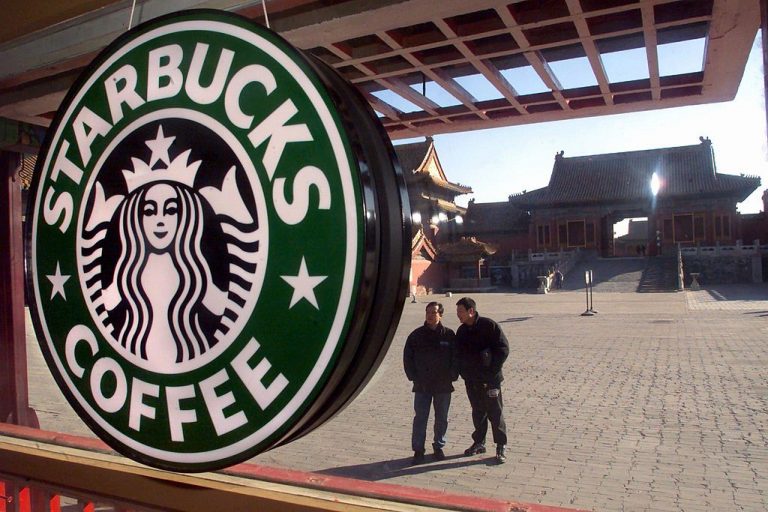Several major companies, including Starbucks, Apple, Estee Lauder, and other U.S.-listed companies have warned in quarterly earnings reports that China’s “zero-COVID” controls will severely drag down profit and impact business.
International companies have faced a number of operational challenges in China, and the recent tightening of pandemic restrictions will only continue that trend. According to Bank of America’s proprietary model, S&P 500 companies in China have fallen to the lowest since the second quarter of 2020.
Since mid-March, China has been struggling against the Omicron variant by enacting harsh lockdowns and eliminating freedom of movement across its major cities. Health authorities have logged over 15,000 daily new infections of COVID-19 since April, with the country reporting 12,939 positive cases on May 5.
READ MORE ON CHINA’S CORONAVIRUS SITUATION:
- Citizen Journalist Jailed in Shanghai for Speaking Out Against ‘Zero-COVID’ Policy
- Shanghai Reverses Decision to Loosen COVID Restrictions Despite Prolonged Suffering and Economic Damage
- Desperate Residents Protest Shanghai Lockdown: ‘You are driving people to their deaths’
Starbucks and Apple both reported a decrease in same-store sales of over 20 percent — far worse than the 0.2 percent decrease analysts expected, according to FactSet. Starbucks said its in-person sales had gone down by 23 percent since the lockdowns in Shanghai began.
“Conditions in China are such that we have virtually no ability to predict our performance in China in the back half of the year,” Starbucks Interim CEO Howard Schultz said.
Success
You are now signed up for our newsletter
Success
Check your email to complete sign up
The coffee giant suspended its guidance for the rest of the fiscal year, or the remaining two quarters. However, Starbucks said it still expected its business dealings in China to grow larger than its homegrown U.S. audience in the long term.
Despite nearly all its final assembly plants in Shanghai being given the green light to restart production, Apple said the lockdowns would likely impact sales in the current quarter from $4 billion to $8 billion — a “substantially” higher number compared to the last quarter. The other factor affecting sales is the ongoing chip shortage, Apple executives said during an earnings call on April 28.
The effects from China’s lockdowns in Shanghai, and now Beijing, have exacerbated the decline in semiconductor imports by over 5 percent in the first two months of 2022 during a global chip shortage.
“Covid is difficult to predict,” Apple CEO Tim Cook said after describing those estimated costs, according to a transcript from the call obtained by StreetAccount.
Apple also blamed ongoing COVID-19 disruptions for affecting consumer demand in China.

Beijing tightens restrictions
Authorities in China’s capital announced Friday, May 6, that all non-essential services in its sprawling district of Chaoyang, home to embassies and large offices, would close until further notice. Mass testing will also resume in at least four districts over the weekend.
Unlike other countries, which have loosened their controversial pandemic restrictions, the Chinese authorities have doubled down on their ruinous zero-tolerance approach. The latest lockdown in Shanghai was brought on at the end of March as health experts using a more targeted anti-epidemic regime were apparently sidelined in favor of the draconian “zero-COVID” policy.
Meanwhile, organizers of the Asian Games, originally scheduled to take place in the eastern city of Hangzhou in September, also announced today that the event would be postponed until 2023 due to COVID restrictions.
“We will try to cooperate,” Hu, a 42-year-old finance professional from Beijing told Reuters.
“But I also hope that the government can introduce some policies that will not affect the overall life of citizens. After all, we all have mortgages and car loans,” Hu, who gave only her surname in fear of retaliation from the government, said.
Beijing authorities are scrambling to avoid an explosion in cases like the one that forced the financial hub of Shanghai into complete lockdown for over a month, resulting in severe losses to its financial and economic sectors as most stores and businesses were forced to remain closed for weeks on end.
The prolonged lockdowns also negatively impacted the psychological health of its residents, with some committing suicide by jumping off rooftops as they reached their breaking point, and others starving to death after completely running out of food and water, and unable to leave their homes to procure more.
Recently, Shanghai appeared to ease some restrictions, allowing an estimated 4 million people to leave their homes. However, as new infections continued being found, authorities again tightened restrictions in certain areas, notifying residents that the lockdowns would continue until the virus is ”fully brought under control.”
China’s top officials defend ‘zero-COVID’ protocols
After the Standing Committee of the Communist Party’s Politburo held a quarterly economic meeting on April 28, Chinese state media reported Wednesday that China would fight any comment or action that “distorted, doubted or repudiated” its “zero-COVID” policy.
The Politburo, the top-ruling body of the Chinese Communist Party (CCP), saw its 25 members, including leader Xi Jinping, vow to speed up the implementation of existing tax-cut and supportive policies, as well as the introduction of new monetary policy tools to enhance investments during the fiscal meeting.
According to a statement released after the meeting, new regulatory policies for several industries were also revealed, with tech giants Alibaba and Tencent hoping they will be greeted with good news ahead of next month’s regulatory meeting with the country’s tech sector.
“We must insist on the policies of preventing both inbound infections and a domestic rebound of cases, and [adhere to] dynamic Zero-Covid, doing our best to protect people’s lives and minimize its impact on the national economy and society,” the statement said.
Relaxing COVID controls, however, which are in place in dozens of cities across the world’s second-largest economy, would lead to large-scale infections, it warned.














